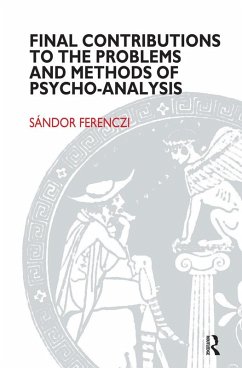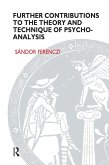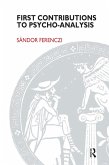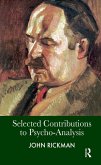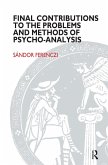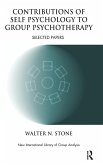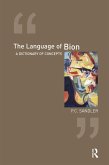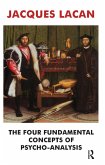Sandor Ferenczi
Final Contributions to the Problems and Methods of Psycho-analysis (eBook, ePUB)
55,95 €
55,95 €
inkl. MwSt.
Sofort per Download lieferbar

28 °P sammeln
55,95 €
Als Download kaufen

55,95 €
inkl. MwSt.
Sofort per Download lieferbar

28 °P sammeln
Jetzt verschenken
Alle Infos zum eBook verschenken
55,95 €
inkl. MwSt.
Sofort per Download lieferbar
Alle Infos zum eBook verschenken

28 °P sammeln
Sandor Ferenczi
Final Contributions to the Problems and Methods of Psycho-analysis (eBook, ePUB)
- Format: ePub
- Merkliste
- Auf die Merkliste
- Bewerten Bewerten
- Teilen
- Produkt teilen
- Produkterinnerung
- Produkterinnerung

Bitte loggen Sie sich zunächst in Ihr Kundenkonto ein oder registrieren Sie sich bei
bücher.de, um das eBook-Abo tolino select nutzen zu können.
Hier können Sie sich einloggen
Hier können Sie sich einloggen
Sie sind bereits eingeloggt. Klicken Sie auf 2. tolino select Abo, um fortzufahren.

Bitte loggen Sie sich zunächst in Ihr Kundenkonto ein oder registrieren Sie sich bei bücher.de, um das eBook-Abo tolino select nutzen zu können.
First published in 1955, this book contains papers written by Ferenczi during his last years and some of his unpublished notes. It demonstrates Ferenczi's combination of great clinical understanding and an almost uncanny insight into unconscious process.
- Geräte: eReader
- mit Kopierschutz
- eBook Hilfe
- Größe: 1.68MB
Andere Kunden interessierten sich auch für
![Further Contributions to the Theory and Technique of Psycho-analysis (eBook, ePUB) Further Contributions to the Theory and Technique of Psycho-analysis (eBook, ePUB)]() Sandor FerencziFurther Contributions to the Theory and Technique of Psycho-analysis (eBook, ePUB)63,95 €
Sandor FerencziFurther Contributions to the Theory and Technique of Psycho-analysis (eBook, ePUB)63,95 €![First Contributions to Psycho-analysis (eBook, ePUB) First Contributions to Psycho-analysis (eBook, ePUB)]() Sandor FerencziFirst Contributions to Psycho-analysis (eBook, ePUB)55,95 €
Sandor FerencziFirst Contributions to Psycho-analysis (eBook, ePUB)55,95 €![Selected Contributions to Psycho-Analysis (eBook, ePUB) Selected Contributions to Psycho-Analysis (eBook, ePUB)]() John RickmanSelected Contributions to Psycho-Analysis (eBook, ePUB)51,95 €
John RickmanSelected Contributions to Psycho-Analysis (eBook, ePUB)51,95 €![Final Contributions to the Problems and Methods of Psycho-analysis (eBook, PDF) Final Contributions to the Problems and Methods of Psycho-analysis (eBook, PDF)]() Sandor FerencziFinal Contributions to the Problems and Methods of Psycho-analysis (eBook, PDF)55,95 €
Sandor FerencziFinal Contributions to the Problems and Methods of Psycho-analysis (eBook, PDF)55,95 €![Contributions of Self Psychology to Group Psychotherapy (eBook, ePUB) Contributions of Self Psychology to Group Psychotherapy (eBook, ePUB)]() Walter N. StoneContributions of Self Psychology to Group Psychotherapy (eBook, ePUB)39,95 €
Walter N. StoneContributions of Self Psychology to Group Psychotherapy (eBook, ePUB)39,95 €![The Language of Bion (eBook, ePUB) The Language of Bion (eBook, ePUB)]() P. C. SandlerThe Language of Bion (eBook, ePUB)72,95 €
P. C. SandlerThe Language of Bion (eBook, ePUB)72,95 €![The Four Fundamental Concepts of Psycho-Analysis (eBook, ePUB) The Four Fundamental Concepts of Psycho-Analysis (eBook, ePUB)]() Jacques LacanThe Four Fundamental Concepts of Psycho-Analysis (eBook, ePUB)29,95 €
Jacques LacanThe Four Fundamental Concepts of Psycho-Analysis (eBook, ePUB)29,95 €-
-
-
First published in 1955, this book contains papers written by Ferenczi during his last years and some of his unpublished notes. It demonstrates Ferenczi's combination of great clinical understanding and an almost uncanny insight into unconscious process.
Dieser Download kann aus rechtlichen Gründen nur mit Rechnungsadresse in A, B, BG, CY, CZ, D, DK, EW, E, FIN, F, GR, HR, H, IRL, I, LT, L, LR, M, NL, PL, P, R, S, SLO, SK ausgeliefert werden.
Produktdetails
- Produktdetails
- Verlag: Taylor & Francis eBooks
- Seitenzahl: 448
- Erscheinungstermin: 2. Januar 2018
- Englisch
- ISBN-13: 9780429913754
- Artikelnr.: 54934107
- Verlag: Taylor & Francis eBooks
- Seitenzahl: 448
- Erscheinungstermin: 2. Januar 2018
- Englisch
- ISBN-13: 9780429913754
- Artikelnr.: 54934107
- Herstellerkennzeichnung Die Herstellerinformationen sind derzeit nicht verfügbar.
Sandor Ferenczi (7 July 1873 - 22 May 1933) was a Hungarian psychoanalyst, a key theorist of the psychoanalytic school and a close associate of Sigmund Freud whod latter wrote that Ferenczi made "all analysts his students", a fitting tribute to a towering figure of psychoanalysis. In 1910, at Freud's suggestion, Ferenczi proposed the founding of the International Psychoanalytic Association, and in 1913 founded the Hungarian Psychoanalytic Society. In 1916 he underwent a brief personal analysis with Freud, and in 1918 was elected president of the International Psychoanalytic Society. Ferenczi's early contributions to psychoanalysis have been so fully assimilated that their origin is often forgotten, although his later writings, which were more speculative and deviated from Freudian orthodoxy, have been less widely accepted. He is acknowledged to have been a gifted therapist. He proposed a number of innovations in technique including at first these centered on the so-called "active" technique, while his later study of reactions of disappointment and mistrust that the child suffers in his relationship with his parents inspired a few of his pupils, notably Alice Balint (1949), to investigate early parent-child relationships.
Editor's Note
Later Papers
To Sigmund Freud on his Seventieth Birthday 1
Freud's Importance for the Mental Hygiene Movement 1
Organ Neuroses and Their Treatment 1
Present-Day Problems in Psycho-Analysis 1
Gulliver Phantasies 1
The Adaptation of the Family to the Child 1
The Problem of the Termination of the Analysis 1
The Elasticity of Psycho-Analytic Technique 1
The Unwelcome Child and His Death Instinct 1
The Principle of Relaxation and Neocatharsis 1
Child Analysis in the Analysis of Adults 1
Freud's Influence on Medicine 1
Confusion of Tongues between Adults and the Child 1
Posthumous Papers
More about Homosexuality 1
On the Interpretation of Tunes that Come Into One's Head 1
Laughter 1
Mathematics 1
On Epileptic Fits Observations and Reflections 1
A Contribution to the Understanding of the Psychoneuroses of the Age of Involution 1
Paranoia 1
Notes and Fragments 1
Papers Omitted from Previous Collections
Psycho-Analysis and Education 1
The Effect on Women of Premature Ejaculation in Men 1
Stimulation of the anal Erotogenic Zone as a Precipitating Factor in Paranoia 1
On the Organization of the Psycho-Analytic Movement
Exploring the Unconscious 1
Dirigible Dreams 1
On the Definition of Introjegtion 1
A Case of 'Déjà Vu' 1
Varia: 1 On the Genealogy of the 'Fig-Leaf'
Varia: Metaphysics .. Metapsychology
Varia: Paracelsus to the Physicians
Varia: Goethe on the Reality Value of the Poet's Fantasy
A Forerunner of Freud in the Theory of Sex 1
Philosophy and Psycho-Analysis 1
Interpretation of Unconscious Incestuous Fantasies from a Parapraxis (In Brantôme) 1
Taming of a Wild Horse 1
On the Genesis of the Jus Primae Noctis 1
Review 1 of 'Die Psychische Bedingheit und Psychoanalytische Behandlung Organischer Leiden'
Review 1 of 'Der Seelensucher'
Discussion on Tic 1
Psycho-Analysis and the Mental Disorders of General Paralysis of the Insane 1
Freud's 'Group Psychology and the Analysis of the Ego' 1
Bibliography
Later Papers
To Sigmund Freud on his Seventieth Birthday 1
Freud's Importance for the Mental Hygiene Movement 1
Organ Neuroses and Their Treatment 1
Present-Day Problems in Psycho-Analysis 1
Gulliver Phantasies 1
The Adaptation of the Family to the Child 1
The Problem of the Termination of the Analysis 1
The Elasticity of Psycho-Analytic Technique 1
The Unwelcome Child and His Death Instinct 1
The Principle of Relaxation and Neocatharsis 1
Child Analysis in the Analysis of Adults 1
Freud's Influence on Medicine 1
Confusion of Tongues between Adults and the Child 1
Posthumous Papers
More about Homosexuality 1
On the Interpretation of Tunes that Come Into One's Head 1
Laughter 1
Mathematics 1
On Epileptic Fits Observations and Reflections 1
A Contribution to the Understanding of the Psychoneuroses of the Age of Involution 1
Paranoia 1
Notes and Fragments 1
Papers Omitted from Previous Collections
Psycho-Analysis and Education 1
The Effect on Women of Premature Ejaculation in Men 1
Stimulation of the anal Erotogenic Zone as a Precipitating Factor in Paranoia 1
On the Organization of the Psycho-Analytic Movement
Exploring the Unconscious 1
Dirigible Dreams 1
On the Definition of Introjegtion 1
A Case of 'Déjà Vu' 1
Varia: 1 On the Genealogy of the 'Fig-Leaf'
Varia: Metaphysics .. Metapsychology
Varia: Paracelsus to the Physicians
Varia: Goethe on the Reality Value of the Poet's Fantasy
A Forerunner of Freud in the Theory of Sex 1
Philosophy and Psycho-Analysis 1
Interpretation of Unconscious Incestuous Fantasies from a Parapraxis (In Brantôme) 1
Taming of a Wild Horse 1
On the Genesis of the Jus Primae Noctis 1
Review 1 of 'Die Psychische Bedingheit und Psychoanalytische Behandlung Organischer Leiden'
Review 1 of 'Der Seelensucher'
Discussion on Tic 1
Psycho-Analysis and the Mental Disorders of General Paralysis of the Insane 1
Freud's 'Group Psychology and the Analysis of the Ego' 1
Bibliography
Editor's Note
Later Papers
To Sigmund Freud on his Seventieth Birthday 1
Freud's Importance for the Mental Hygiene Movement 1
Organ Neuroses and Their Treatment 1
Present-Day Problems in Psycho-Analysis 1
Gulliver Phantasies 1
The Adaptation of the Family to the Child 1
The Problem of the Termination of the Analysis 1
The Elasticity of Psycho-Analytic Technique 1
The Unwelcome Child and His Death Instinct 1
The Principle of Relaxation and Neocatharsis 1
Child Analysis in the Analysis of Adults 1
Freud's Influence on Medicine 1
Confusion of Tongues between Adults and the Child 1
Posthumous Papers
More about Homosexuality 1
On the Interpretation of Tunes that Come Into One's Head 1
Laughter 1
Mathematics 1
On Epileptic Fits Observations and Reflections 1
A Contribution to the Understanding of the Psychoneuroses of the Age of Involution 1
Paranoia 1
Notes and Fragments 1
Papers Omitted from Previous Collections
Psycho-Analysis and Education 1
The Effect on Women of Premature Ejaculation in Men 1
Stimulation of the anal Erotogenic Zone as a Precipitating Factor in Paranoia 1
On the Organization of the Psycho-Analytic Movement
Exploring the Unconscious 1
Dirigible Dreams 1
On the Definition of Introjegtion 1
A Case of 'Déjà Vu' 1
Varia: 1 On the Genealogy of the 'Fig-Leaf'
Varia: Metaphysics .. Metapsychology
Varia: Paracelsus to the Physicians
Varia: Goethe on the Reality Value of the Poet's Fantasy
A Forerunner of Freud in the Theory of Sex 1
Philosophy and Psycho-Analysis 1
Interpretation of Unconscious Incestuous Fantasies from a Parapraxis (In Brantôme) 1
Taming of a Wild Horse 1
On the Genesis of the Jus Primae Noctis 1
Review 1 of 'Die Psychische Bedingheit und Psychoanalytische Behandlung Organischer Leiden'
Review 1 of 'Der Seelensucher'
Discussion on Tic 1
Psycho-Analysis and the Mental Disorders of General Paralysis of the Insane 1
Freud's 'Group Psychology and the Analysis of the Ego' 1
Bibliography
Later Papers
To Sigmund Freud on his Seventieth Birthday 1
Freud's Importance for the Mental Hygiene Movement 1
Organ Neuroses and Their Treatment 1
Present-Day Problems in Psycho-Analysis 1
Gulliver Phantasies 1
The Adaptation of the Family to the Child 1
The Problem of the Termination of the Analysis 1
The Elasticity of Psycho-Analytic Technique 1
The Unwelcome Child and His Death Instinct 1
The Principle of Relaxation and Neocatharsis 1
Child Analysis in the Analysis of Adults 1
Freud's Influence on Medicine 1
Confusion of Tongues between Adults and the Child 1
Posthumous Papers
More about Homosexuality 1
On the Interpretation of Tunes that Come Into One's Head 1
Laughter 1
Mathematics 1
On Epileptic Fits Observations and Reflections 1
A Contribution to the Understanding of the Psychoneuroses of the Age of Involution 1
Paranoia 1
Notes and Fragments 1
Papers Omitted from Previous Collections
Psycho-Analysis and Education 1
The Effect on Women of Premature Ejaculation in Men 1
Stimulation of the anal Erotogenic Zone as a Precipitating Factor in Paranoia 1
On the Organization of the Psycho-Analytic Movement
Exploring the Unconscious 1
Dirigible Dreams 1
On the Definition of Introjegtion 1
A Case of 'Déjà Vu' 1
Varia: 1 On the Genealogy of the 'Fig-Leaf'
Varia: Metaphysics .. Metapsychology
Varia: Paracelsus to the Physicians
Varia: Goethe on the Reality Value of the Poet's Fantasy
A Forerunner of Freud in the Theory of Sex 1
Philosophy and Psycho-Analysis 1
Interpretation of Unconscious Incestuous Fantasies from a Parapraxis (In Brantôme) 1
Taming of a Wild Horse 1
On the Genesis of the Jus Primae Noctis 1
Review 1 of 'Die Psychische Bedingheit und Psychoanalytische Behandlung Organischer Leiden'
Review 1 of 'Der Seelensucher'
Discussion on Tic 1
Psycho-Analysis and the Mental Disorders of General Paralysis of the Insane 1
Freud's 'Group Psychology and the Analysis of the Ego' 1
Bibliography
